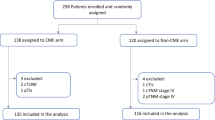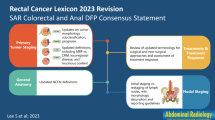Abstract
Background
This study aimed to prospectively evaluate operative safety and mid-term oncologic outcomes of laparoscopic rectal cancer resection performed by a single surgeon.
Methods
Three hundreds twelve patients (male, 181) were enrolled in this analysis. 257 patients (82.4%) had tumors located below 12 cm from the anal verge. Distribution of TNM stages was 0:I:II:III:IV = 4.2%:17.9%:32.4%:37.2%:8.3%. 225 patients (71.1%) had T3/T4 lesions. Pre- and post-operative radiation was given in 6 and 20 patients, respectively.
Results
Sphincter-preserving operation was performed in 85.9%. Mean operating time was 212 minutes. Conversion rate was 2.6%. Overall morbidity rate was 21.1%. Anastomotic leakage occurred in 6.4%. Operative mortality rate was 0.3%. Mean number of harvested nodes was 23. Mean distal tumor-free margin was 2.8 cm. The circumferential resection margin was positive in 13 patients (4.2%). With a mean follow-up of 30 months in the stage I–III patients, the local recurrence rate was 2.9%. Systemic recurrence occurred in 11.7%. No port-site recurrence was observed.
Conclusion
Laparoscopic resection of rectal cancer provided safe operative parameters and adequate mid-term oncologic outcomes. When considering a high volume of advanced and low-lying cancers but rather narrow indication to radiotherapy, the 2.9% local recurrence rate seems promising data. Long-term follow-up is mandatory to draw conclusion.
Similar content being viewed by others
References
Barlehner E, Benhidjeb T, Anders S, Schicke B (2005) Laparoscopic resection for rectal cancer: outcomes in 194 patients and review of the literature. Surg Endosc 19: 757–766
Breukink SO, Pierie JP, Grond AJ, Hoff C, Wiggers T, Meijerink WJ (2005) Laparoscopic versus open total mesorectal excision: a case-control study. Int J Colorectal Dis 20: 428–433
Delgado S, Momblan D, Salvador L, Bravo R, Castells A, Ibarzabal A, Pique JM, Lacy AM (2004) Laparoscopic-assisted approach in rectal cancer patients: lessons learned from >200 patients. Surg Endosc 18: 1457–1462
Enker WE, Merchant N, Cohen AM, Lanouette NM, Swallow C, Guillem J, Paty P, Minsky B, Weyrauch K, Quan SH (1999) Safety and efficacy of low anterior resection for rectal cancer: 681 consecutive cases from a specialty service. Ann Surg 230: 544–552
Guillou PJ, Quirke P, Thorpe H, Walker J, Jayne DG, Smith AM, Heath RM, Brown JM, MRC CLASICC trial group (2005) Short-term endpoints of conventional versus laparoscopic-assisted surgery in patients with colorectal cancer (MRC CLASICC trial): multicentre, randomised controlled trial. Lancet 365: 1718–1726
Heald RJ, Moran BJ, Ryall RD, Sexton R, MacFarlane JK (1998) Rectal cancer: the Basingstoke experience of total mesorectal excision, 1978–1997. Arch Surg 133: 894–899
Karanjia ND, Corder AP, Bearn P, Heald RJ (1994) Leakage from stapled low anastomosis after total mesorectal excision for carcinoma of the rectum. Br J Surg 81: 1224–1226
Killingback M, Barron P, Dent OF (2001) Local recurrence after curative resection of cancer of the rectum without total mesorectal excision. Dis Colon Rectum 44: 473–483
Kneist W, Heintz A, Junginger T (2005) Major urinary dysfunction after mesorectal excision for rectal carcinoma. Br J Surg 92: 230–234
Law WL, Chu KW (2004) Anterior resection for rectal cancer with mesorectal excision: a prospective evaluation of 622 patients. Ann Surg 240: 260–268
Leroy J, Jamali F, Forbes L, Smith M, Rubino F, Mutter D, Marescaux J (2004) Laparoscopic total mesorectal excision (TME) for rectal cancer surgery: long-term outcomes. Surg Endosc 18: 281–289
Leung KL, Kwok SP, Lam SC, Lee JF, Yiu RY, Ng SS, Lai PB, Lau WY (2004) Laparoscopic resection of rectosigmoid carcinoma: prospective randomised trial. Lancet 363: 1187–1192
Lopez-Kostner F, Lavery IC, Hool GR, Rybicki LA, Fazio VW (1998) Total mesorectal excision is not necessary for cancers of the upper rectum. Surgery 124: 612–617
Maurer CA, Z’Graggen K, Renzulli P, Schilling MK, Netzer P, Buchler MW (2001) Total mesorectal excision preserves male genital function compared with conventional rectal cancer surgery. Br J Surg 88: 1501–1505
Moore E, Heald RJ, Cecil TD, Sharpe GD, Sexton R, Moran BJ (2005) Almost all five year disease free survivors are cured following rectal cancer surgery, but longer term follow-up detects some late local and systemic recurrences. Colorectal Dis 7: 403–405
Morino M, Parini U, Giraudo G, Salval M, Brachet Contul R, Garrone C (2003) Laparoscopic total mesorectal excision: a consecutive series of 100 patients. Ann Surg 237: 335–342
Poulin EC, Schlachta CM, Gregoire R, Seshadri P, Cadeddu MO, Mamazza J (2002) Local recurrence and survival after laparoscopic mesorectal resection for rectal adenocarcinoma. Surg Endosc 16: 989–995
Saha SK (1984) A critical evaluation of dissection of the perineum in synchronous combined abdominoperineal excision of the rectum. Surg Gynecol Obstet 158: 33–38
Sauer R, Becker H, Hohenberger W, Rodel C, Wittekind C, Fietkau R, Martus P, Tschmelitsch J, Hager E, Hess CF, Karstens JH, Liersch T, Schmidberger H, Raab R, German Rectal Cancer Study Group (2004) Preoperative versus postoperative chemoradiotherapy for rectal cancer. N Engl J Med 351: 1731–1739
The American Society of Colon and Rectal Surgeons (2004) Approved statement: laparoscopic colectomy for curable cancer. Dis Colon Rectum 47: A1
The Clinical Outcomes of Surgical Therapy Study Group (2004) A comparison of laparoscopically assisted and open colectomy for colon cancer. N Engl J Med 350: 2050–2059
Zaheer S, Pemberton JH, Farouk R, Dozois RR, Wolff BG, Ilstrup D (1998) Surgical treatment of adenocarcinoma of the rectum. Ann Surg 227: 800–811
Author information
Authors and Affiliations
Corresponding author
Rights and permissions
About this article
Cite this article
Kim, SH., Park, IJ., Joh, YG. et al. Laparoscopic resection for rectal cancer: a prospective analysis of thirty-month follow-up outcomes in 312 patients. Surg Endosc 20, 1197–1202 (2006). https://doi.org/10.1007/s00464-005-0599-2
Received:
Accepted:
Published:
Issue Date:
DOI: https://doi.org/10.1007/s00464-005-0599-2




